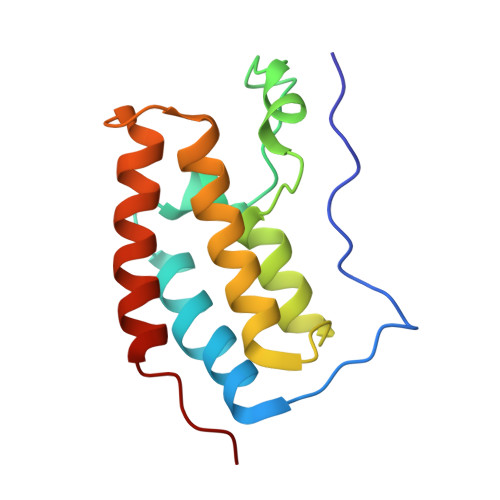Application of Atypical Acetyl-lysine Methyl Mimetics in the Development of Selective Inhibitors of the Bromodomain-Containing Protein 7 (BRD7)/Bromodomain-Containing Protein 9 (BRD9) Bromodomains.
Clegg, M.A., Bamborough, P., Chung, C.W., Craggs, P.D., Gordon, L., Grandi, P., Leveridge, M., Lindon, M., Liwicki, G.M., Michon, A.M., Molnar, J., Rioja, I., Soden, P.E., Theodoulou, N.H., Werner, T., Tomkinson, N.C.O., Prinjha, R.K., Humphreys, P.G.(2020) J Med Chem 63: 5816-5840
- PubMed: 32410449
- DOI: https://doi.org/10.1021/acs.jmedchem.0c00075
- Primary Citation of Related Structures:
6YQR, 6YQS, 6YQW, 6YQZ - PubMed Abstract:
Non-BET bromodomain-containing proteins have become attractive targets for the development of novel therapeutics targeting epigenetic pathways. To help facilitate the target validation of this class of proteins, structurally diverse small-molecule ligands and methodologies to produce selective inhibitors in a predictable fashion are in high demand. Herein, we report the development and application of atypical acetyl-lysine (KAc) methyl mimetics to take advantage of the differential stability of conserved water molecules in the bromodomain binding site. Discovery of the n -butyl group as an atypical KAc methyl mimetic allowed generation of 31 (GSK6776) as a soluble, permeable, and selective BRD7/9 inhibitor from a pyridazinone template. The n -butyl group was then used to enhance the bromodomain selectivity of an existing BRD9 inhibitor and to transform pan-bromodomain inhibitors into BRD7/9 selective compounds. Finally, a solvent-exposed vector was defined from the pyridazinone template to enable bifunctional molecule synthesis, and affinity enrichment chemoproteomic experiments were used to confirm several of the endogenous protein partners of BRD7 and BRD9, which form part of the chromatin remodeling PBAF and BAF complexes, respectively.
- GlaxoSmithKline R&D, Stevenage SG1 2NY, Hertfordshire, United Kingdom.
Organizational Affiliation:


















